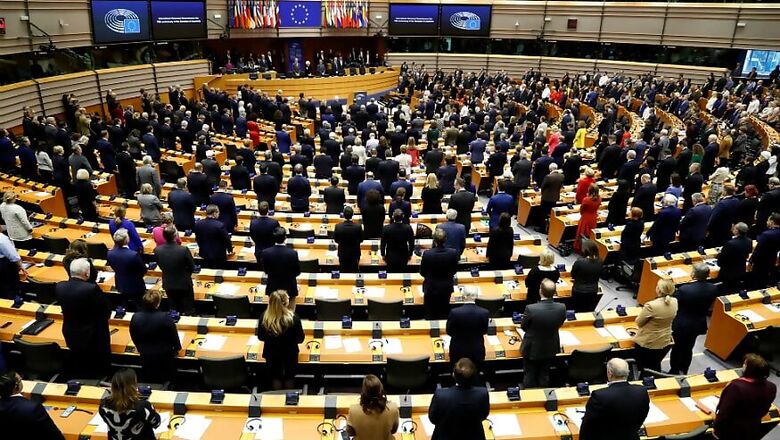
views
New Delhi: Two weeks after Josep Borrell, the High Representative of European Union for Foreign Affairs, visited India for the government-backed 'Raisina Dialogue' event here, the European Parliament will debate and vote on a resolution that makes use of scathing language against India's Citizenship Amendment Act (CAA).
A draft of the final resolution, which combines the six previous resolution by several parties, has been placed on the final agenda for debate at the Plenary session in Brussels on Wednesday. The draft says it "deeply regrets the adoption and implementation of the CAA, which is discriminatory in nature and dangerously divisive".
It asks the Indian government to pay heed to the citizens' petitions and also joins the dots between the CAA and the National Register of Citizens (NRC) to drive home the point.
However, an expected vote on the motion on Thursday has been postponed until the Parliament's Plenary session in March.
"Following a decision by MEPs at the opening of today's Plenary session in Brussels, the vote on the resolution on India's Citizenship (Amendment) Act 2019 has been postponed to the March session," said a statement from the European Parliament.
The reason behind the postponement of the vote is unconfirmed but will come as a boost to the Indian government's efforts against such a motion being voted on by the European Parliament.
Government sources hailed it as "a diplomatic victory", saying friends of India prevailed over those of Pakistan in the European Parliament.
"Strenuous efforts of outgoing British MEP Shaffaq Mohammad to have a resolution passed by the European Parliament against India on the penultimate day before Brexit were defeated," a source said.
India reached out to almost all countries of the powerful block, trying to persuade them against going ahead with the resolution against the CAA.
Sources said the European lawmakers agreed to delay the voting to get a direct perspective from about the CAA from External Affairs Minister S Jaishankar who is scheduled to visit Brussels to prepare the ground for Prime Minister Narendra Modi's visit in mid-March.
The EU lawmakers also wanted to wait for judicial review of the contentious law by India's Supreme Court.
The draft of the joint motion for resolution points out that there has been a "brutal crackdown" on "peaceful protesters" and highlights BJP-ruled Uttar Pradesh as an example. The paragraph says: "Indian authorities have also used internet shutdown, curfews and limits on public transportation to prevent peaceful protesters in addition to reports of hundreds of protesters being beaten, shot, and tortured, in particular in Uttar Pradesh."
At least four speakers on the list of parliamentarians speaking on the resolution on CAA were taken to Kashmir last October by the government. They are France's Thierry Mariana, Poland's Ryszard Czarnecki, France's France Jamet, and Germany's Bernard Zimniok.
The government expressed its displeasure over these developments and the EU Ambassador to India, Ugo Astuto, was summoned by the Ministry of External Affairs for a meeting. Government sources said they hoped the sponsors and supporters of the resolutions will engage with India to get a full and accurate assessment of the facts before proceeding further.
The EU delegation on its part stated that "the European Parliament is an independent institution, sovereign in the organisation of its work and in its deliberations". But this was followed by another statement issued by an EU official from Brussels stating, "The opinions expressed by the European Parliament and its members do not represent the official position of the European Union."
The revised statement, clarifying the official position to distance itself from the resolution, appears to have been made keeping in mind Modi's upcoming visit to Brussels for the India-EU Summit. The statement said the summit was with a view to "strengthen its strategic partnership with India". The European bloc is India's largest trading partner.
Diplomatic sources also pointed out that foreign policy-related issues are mostly the prerogative of member states individually and the European Parliament's opinion or resolution on this count is certainly not binding. Every EU member state has its own, independent foreign policy, and many do not approve of commenting on another country's internal issues, added the source.
But the European Parliament clearly states that it "does not believe that people's basic rights end at the EU's borders. MEPs regularly speak out – individually and in unison – about human rights issues in non-EU countries. Because these rights are considered universal".
The resolution is built on the aspect of human rights citing the United Nations Convention on Status of Stateless Persons, EU Guidelines of Human Rights Defenders, and the statement by UN experts on the risk of statelessness for millions and instability in Assam, India, to quote a few.
Lok Sabha Speaker Om Birla on Monday wrote to European Parliament President David Maria Sassoli over the resolutions, saying it is inappropriate for one legislature to pass judgement on another and the practice can be misused by vested interests. Vice President M Venkaiah Naidu had also reiterated India's stand, saying there is no scope for outside interference in the country's internal matters.
(With inputs from PTI)




















Comments
0 comment